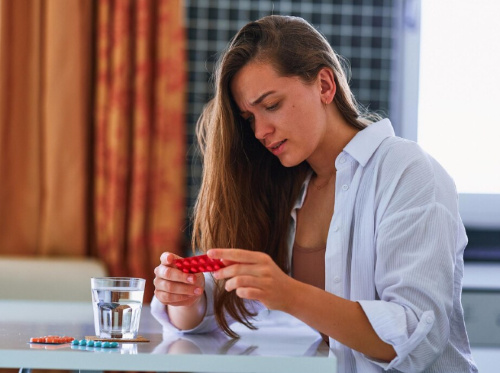Isotretinoin 20mg is a powerful medication primarily used to treat severe or cystic acne that hasn’t responded to other treatments. It’s commonly known by brand names like Accutane, though many generics are available. While incredibly effective, isotretinoin comes with strict precautions due to its potential side effects.
In this article, we’ll explain what isotretinoin is, how it works, what to expect while taking it, the common side effects, and important precautions you must follow for safe and successful treatment.
🔬 What Is Isotretinoin?
Isotretinoin is an oral retinoid, a derivative of vitamin A. It works by targeting the root causes of acne:
-
Reduces oil (sebum) production from sebaceous glands
-
Prevents clogged pores and reduces bacterial growth
-
Decreases inflammation in the skin
-
Shrinks the oil glands permanently
This multi-faceted action makes isotretinoin effective even for severe, scarring acne or nodulocystic acne that doesn’t improve with antibiotics, creams, or hormonal therapy.
✅ Who Is Isotretinoin For?
Doctors usually prescribe isotretinoin when:
-
Acne is severe, cystic, or scarring
-
Other treatments have failed
-
Acne causes emotional distress or affects quality of life
-
Acne flares keep recurring despite medications
It’s also sometimes used off-label for conditions like:
-
Rosacea (in certain cases)
-
Seborrhea
-
Hidradenitis suppurativa
💊 How to Use Isotretinoin
Dosage:
Isotretinoin is taken orally, usually once or twice daily with food. Dosage depends on your weight and severity of acne. A typical course lasts 4 to 6 months, but may vary. You can also visit dosepharmacy to get more information about accutane for acne.
Doctors aim for a cumulative dose (total amount over time) to reduce relapse risk. For example, about 120–150 mg per kg of body weight is standard.
Important Instructions:
-
Always take with a fatty meal for better absorption.
-
Never take vitamin A supplements during treatment—this can cause toxicity.
-
Use a gentle skincare routine—no exfoliants, peels, or strong acids.
📅 What to Expect During Treatment
Initial Breakout:
Many patients experience a “purging” phase—acne may worsen in the first few weeks before improving. This is temporary and usually subsides.
Visible Results:
-
1 month: Oiliness starts to decrease
-
2–3 months: Breakouts reduce
-
4–6 months: Major clearing for most patients
By the end of treatment, about 85% of patients see long-term remission of acne.
⚠️ Common Side Effects
Because isotretinoin is a strong medication, side effects are common but manageable if monitored properly.
Most common side effects include:
-
Dry skin and lips (almost everyone gets this)
-
Dry eyes, nose, and mouth
-
Nosebleeds due to dryness
-
Joint or muscle pain
-
Skin sensitivity to the sun
Less common but serious effects include:
-
Mood changes or depression (still debated but monitored)
-
Increased cholesterol or liver enzymes
-
Hair thinning or shedding (usually temporary)
-
Night vision issues (rare but possible)
🧪 Regular Monitoring Is a Must
Before and during treatment, you’ll need regular blood tests to check:
-
Liver function
-
Lipid profile (cholesterol, triglycerides)
-
Pregnancy tests for females (monthly)
Your doctor will monitor these closely and adjust the dose if needed.
🚫 Pregnancy and Isotretinoin: A Serious Warning
Isotretinoin is highly teratogenic, meaning it can cause severe birth defects if taken during pregnancy. Even one dose can be harmful.
For females of childbearing age:
-
Two forms of birth control must be used during treatment and for at least 1 month before and after
-
Monthly pregnancy tests are mandatory
-
You must be enrolled in a pregnancy prevention program, like iPLEDGE (in some countries)
Pregnancy must be completely avoided while using isotretinoin.
🧴 Skincare Tips During Treatment
Because your skin becomes sensitive and dry, follow a gentle skincare routine:
-
Use non-comedogenic moisturizers (ceramide-based are ideal)
-
Apply lip balm constantly to prevent cracked lips
-
Use mild, hydrating cleansers
-
Avoid acids, scrubs, or exfoliants
-
Always wear broad-spectrum sunscreen (SPF 30 or higher)
Your skin may look worse before it gets better, but patience and care make a big difference.
✅ After Treatment: What Happens?
Most people experience long-term relief from acne. However:
-
A second course may be needed in 10–20% of cases
-
Skin continues improving even after stopping the drug
-
Maintain skincare and avoid harsh products post-treatment
-
Scarring may be addressed later with treatments like lasers or microneedling
🧠 Myths vs. Facts
| Myth | Fact |
|---|---|
| Isotretinoin causes depression in everyone | No conclusive evidence, but mental health is monitored. |
| You’ll never get acne again | Most see long-term remission, but mild acne can return. |
| You can’t wear makeup | You can, but choose gentle, non-comedogenic products. |
| You can’t go out in the sun | You can, but always wear sunscreen and protective clothing. |
📝 Final Thoughts
Isotretinoin can feel intimidating due to its powerful effects and strict guidelines, but for many, it’s a life-changing treatment that clears acne and restores confidence.
Before starting, make sure to:
-
Discuss risks and benefits with your dermatologist
-
Follow all monitoring and safety protocols
-
Take care of your mental and physical well-being during treatment
With careful use and the right support, isotretinoin can deliver results that last for years—even a lifetime.

